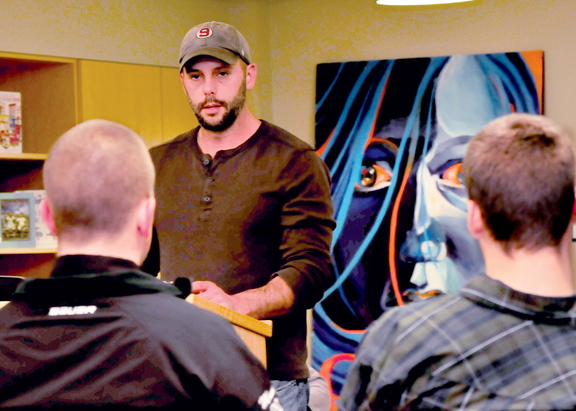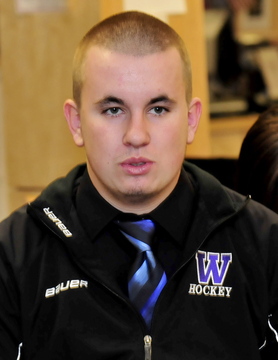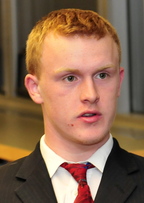For Waterville Senior High School senior Paul Mann, failing a sophomore English class may well have been a hidden blessing.
Mann, 18 and a three-sport athlete, remembers disliking the teacher and skipping that class.
On Wednesday, however, he and nine other high school students sat attentively through a two-hour book reading with three area writers in a special class that will allow them to recover their school credit and graduate from high school on schedule.
The after-school class of three-hour sessions for 15 weeks is designed to help current high school students graduate with their classes by offering a chance to make up a failed English credit.
The importance of completing high school on time is borne out by income averages later in life.
High school dropouts earn about $10,000 less per year than people with a high school diploma, according to U.S. Census Bureau statistics, and $36,000 less per year than someone with a bachelor’s degree.
A recent study by America Works, a nationwide employment agency, indicated that only 40 percent of jobs nationwide are open to high school dropouts, and fewer than one-third of those jobs pay more than $25,000.
The credit recovery class, which also serves people returning to obtain their high school diplomas, was developed through a partnership among the Mid-Maine Regional Adult Community Education and the towns of Oakland, Waterville and Winslow.
“I’m out in the public constantly trying to tell people what adult education offers,” said Susan Tuthill, director of the Mid-Maine Adult Education program. “People don’t have any idea that we do this. They think we do quilting and enrichment classes only.”
A credit recovery course has been offered through the adult education program for at least 25 years, according to Tuthill, who, before she was program director, was the high school guidance director in Waterville for 20 years.
High school students who qualify for the credit recovery program are recommended by guidance departments and apply for the class, which is taught by adult education instructor Paula Raymond.
“My focus in class is to bring students an awareness of where literacy begins,” Raymond said. “If they get a better understanding of the full weight of literacy, they gain an appreciation.”
For many students, the class certainly wasn’t something they had anticipated enjoying.
“When I first started this class, I thought, three hours? But when you start working, it seems like five minutes goes by and the class is already over,” Mann said.
The structure of the class is what varies the most from high school. While most English classes are about 80 minutes long, the weekly credit recovery class lasts three hours. The added class time, combined with a smaller student-to-instructor ratio, provides more time for one-on-on instruction.
“I’ve learned a lot more in this English class,” said Keegan Stetson, 16 and a Waterville junior. “We get help individually when we need it, compared to other English classes I’ve had where everyone gets instructions at once.”
The goal of the class is to instill in students the importance of language and literacy, Raymond said. She starts the course by looking back at students’ early memories by examining nursery rhymes.
“We talk about how we develop language and how we read it and write it,” Raymond said. “It’s a developmental process. We start with nursery rhymes and other early interactions with language, like street signs and labels at the grocery store.”
From there, the class starts to examine other types of literature, from picture books to novels.
“I want to show the students the different view points of literacy and how it’s in our life all the time,” Raymond said. “I want to show how you work up from picture books, to a couple words on a page to paragraphs.”
The biggest change from this class to the other English class the students have participated in, Raymond said, is the commitment the students need to have for a three-hour, after-school course.
“I try to explain to them that English is a job and part of their job is learning this stuff,” she said. “These students had opportunities before to learn this, and it became a pattern of going to school every day doesn’t become fun anymore. My job is to adjust their mantra about education.”
Mann’s view on English certainly changed after he joined the credit recovery class. He now plays football, hockey and baseball, but couldn’t his first two years of high school because of poor grades. There was one class in particular, Mann’s sophomore English class, that he didn’t adapt to.
“I just didn’t really like the teacher and I kind of gave up,” he said. “I skipped pretty much every class I had.”
Mann overcame his indifference to class as his desire to play sports grew, and by his junior year, he was able to join school teams. Yet to graduate on time, students need four credits of English, and entering his senior year, Mann had only two covered. That’s when he was told about the credit recovery class.
“I really didn’t plan on taking this class,” Mann said. “I had to make up that English credit, but I’m happy I did.”
Mann, who said that he has fallen asleep in other English classes, said the three-hour after-school class holds his attention. For that, he gave credit to Raymond, a retired special eduction teacher who most recently taught full time in Fairfield.
“Paula is probably the best teacher I’ve had,” he said. “If you need help, you get it. It’s a lot more one-on-one.”
Raymond’s method is one of engaging the students and giving little free time during class.
“I keep them busy,” she said, adding that when the students are working in groups or individually, she’s constantly interacting with them, posing questions and other ways to think about the topics on hand. “I try to ask my students, âHow do I make this fun?’ They appreciate having an input.”
On Wednesday, Raymond organized three local writers for a live reading and conversation with the students. Waterville-born authors Rhea Cote Robbins and Ron Currie Jr., along with Morning Sentinel reporter Amy Calder, were the guest speakers.
Cote Robbins, a Waterville high school graduate of who grew up in the city’s South End, is the author of “Down the Plains,” a novel based on her Franco-American upbringing. Robbins is also the founder and executive director of the Franco-American Women’s Institute in Brewer.
Currie, who also grew up in the South End, is author of three books, including “God is Dead” and “Everything Matters!” which won the American Library Association Alex Award. Currie’s work has been reviewed in the San Francisco Chronicle, the New York Times and the New Yorker.
“Don’t be afraid to be disappointed” was Currie’s advice. “Sometimes your writing will take you in directions you haven’t anticipated.”
This was the first year Raymond was able to organize the public reading and conversation, which Raymond hopes to continue.
“I really want my students to have a real-life experience with authors and how they built their love for literacy,” she said. After the inaugural event, which saw about half a dozen people from the public attend, Raymond was pleased with how the students interacted with the writers.
“I think everyone thought the students were well-versed,” she said. “I thought it went well, and our guests told me they were very impressed. I was very pleased.”
When one of the students asked Currie why he enjoyed writing fiction, his response was one that could resonate with the audience.
“When you’re writing fiction, it can be a means of righting your wrongs,” said Currie, to a group of students that were currently righting their own wrongs.
Jesse Scardina — 861-9239jscardina@centralmaine.comTwitter: @jessescardina
Send questions/comments to the editors.





Success. Please wait for the page to reload. If the page does not reload within 5 seconds, please refresh the page.
Enter your email and password to access comments.
Hi, to comment on stories you must . This profile is in addition to your subscription and website login.
Already have a commenting profile? .
Invalid username/password.
Please check your email to confirm and complete your registration.
Only subscribers are eligible to post comments. Please subscribe or login first for digital access. Here’s why.
Use the form below to reset your password. When you've submitted your account email, we will send an email with a reset code.